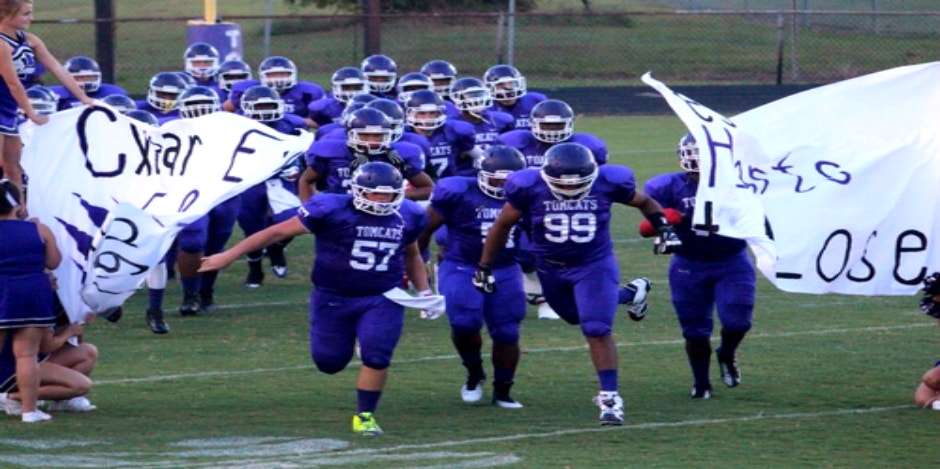The Sad Truth About Football And Kids That We ALL Need To Know
His safety is the most important thing.
 weheartit
weheartit I have yet to meet a man who played football as a kid who is not obsessed with the game still as an adult.
My previous boss, who was in his 50s, never failed to wait by his phone during draft week, hoping any team from the NFL would call to invite him back to play (even though the last time he played football was in high school in 1982).
But Will Smith’s forthcoming new movie, "Concussion," (in theaters this December) brings to light a darker side of football — the severe trauma many football players sustain as a result of repeated impact to their head and body. The film tells the story of Dr. Bennet Omalu, the forensic pathologist who discovered the disease Chronic Traumatic Encephalopathy (or CTE), a condition caused by repeated blows to the head. Though Dr. Omalu was heavily criticized when he first published his report in 2005, recent research validates the concerns he raised back then. The new report found that a staggering 96 percent of deceased NFL football players (tested over the past decade) have positive results for CTE connected with sustaining concussions.
And now the football community is taking notice, as fans grew worried over the string of football suicides, including Hall of Famer Junior Seau (who requested that someone study his brain). His daughter’s online speech about her father’s love for football shows how deeply conflicted football players (and their families) feel about this issue.
As a parent, the conflict now hits close to home as we're forced to re-consider whether it's safe for our sons to play football.
Football is a deeply beloved and deeply entrenched part of American male culture, leaving many parents asking themselves: Can I protect my son while he learns sportsmanship from playing the game?
Now that the impact of concussions among student athletes is also a hot topic in the media, it's time to ask yourself some hard questions before letting your son play the sport:
- Does your son actually want to play? (For his own reasons, not to please adults in his life)
- Will you take him seriously when he says he is hurt?
- Does his coach demonstrate that his training follows brain health standards?
- Does your son have a doctor who can assess changes in the brain?
If these key elements are not in place, then your son is unable to receive the care he needs to keep him safe.
Be Aware: Football is not the only culprit!
Anytime your son or daughter receives a blow to the head, they can sustain a brain injury.
Within a decade’s time, kids in the US visited the emergency room with sports-related head injuries, mostly from bicycling, football, playground activities, basketball and soccer. It's also notable that cheerleading accounts for over half of catastrophic injuries to female athletes (including concussions, skull fractures, etc.)
Also, over 50 percent of traumatic brain injuries come from falls that are not sport-related. So, non-athletes are at risk, too.
So, back to the great "football" debate. Here are four things you must know about letting your son play:
1. Body awareness and control are his best prevention
Many parents misunderstand strength and conditioning to build muscle just for muscle’s sake. A good program teaches your son how his body works. The better his motor control, the faster he can react to his environment, and the stronger his movements are, the best he's able to prevent all injuries.
2. Better rules change his risk
Retiring professional football players suffer from these injuries because we (as a culture, and football as an industry) expect "men" to willingly take on the risk of injury at ALL costs, without incorporating treatment as part of 'playing a great game.'
You can thank NFL Commissioner Roger Goodell for starting to take concussions seriously when he took his job in 2007. Since then the NFL implemented stricter rules regarding head and neck contact. The goal is to reduce needless and excessive damage to players. I hear many fans 'boo' at these changes. They fear football won’t be as exciting. They think the sport is going soft. (easy for them to say when they're not the ones enduring the injuries).
Football is becoming technique-driven. Forget brute force and cheap blows. Encourage these changes if you want to keep your son safe.
3. Concussion treatment is always serious.
This new guideline drafted in 2013 states that if your kid hits his head in a game, even if he doesn't black out or lose his memory, he cannot return to play, period.
Your son should not return to a sport until being cleared by a doctor. It’s not his coaches’ choice, it’s not his choice and it’s not your choice. He really needs to seek medical help if he shows signs of brain injury.
There is no set standard for how quickly your son can return to play. Some kids return after a week, but some still show symptoms after a year. Your physician can test when his brain is ready and has returned to normal activity.
4. Self-reported concussions are much higher than those being seen in the emergency room.
Based on surveys of athletes and their athletic trainers, about 1.6 to 3.8 million athletes of all ages sustain concussions each year in the US. Using your own training can help educate parents around you and hold coaches and medical staff accountable. The best resource for parents is Heads Up, an online resource for parents to understand how to care for your son after a concussion.
Our understanding of concussions has changed DRAMATICALLY since your own high school and college years.
Your son can still enjoy a favorite American sport and be safe. Being up-to-date on these changes is the very best thing you can do as a parent.

